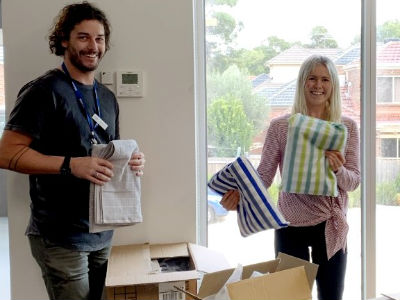May is Domestic and Family Violence Prevention month
There is often a misconception that homelessness only affects people sleeping rough on the streets. Where in reality this only represents a small number of people living without a safe place to sleep. A significant number of the community partners we support provide services for victims of domestic violence. Women and children fleeing dangerous circumstances may have to leave without any belongings and need immediate care. And the current pandemic is placing even more strain on already stretched services.
“Unfortunately, family violence is more prevalent during and after times of disaster such as bushfires and COVID-19. As a result, we are expecting to see an increase in the number of women and children seeking our service and needing safe accommodation,” said Emma, Family Violence Support Worker, Women’s Liberation Halfway House.
Home is not always a safe place to be
One of the key policies we have used to combat COVID-19 is ‘stay home’. But for many women and children home is not a safe place to be. With people’s movement restricted, vulnerable people cannot remove themselves from danger and reach out for the support they need. The widespread job losses, financial uncertainty and physical isolation, on top of already strained relationships riven by violence and coercive behaviour has resulted in a troubling spice in people seeking help.
In a recent interview Mark Speakman, the New South Wales Attorney-General, reported that Google searches on domestic violence are up by 75% since the first COVID-19 case was reported. It is almost certain that COVID-19 will further isolate women and children in danger and limit their ability to seek help. Some service organisations have reported that abusers have used coronavirus-related threats as a form of emotional-physical abuse.
Prior to COVID-19 Services were already stretched
The coronavirus comes at a time when the social services system is already critically overstretched, with one in four Australian women experiencing physical violence since the age of 15. The latest Victorian crime stats show family violence reports are the highest on record, up 6.6 per cent last year to almost 85,000. Experts say it’s too early to tell if that means there’s actually more violence, or more reporting.
Access to service support can be life-saving for someone trapped with an abuser that’s determined to control, harass and isolate them. Whether that’s: being able to go to a refuge where they can be physically safe and hidden; connecting with a specialist who will support them to assess and manage risks to their safety, or having legal assistance that can help them navigate the courts… Every single pathway to a safer future for women in our communities relies on the foundation of access to the specialist services that help victim-survivors get safe; and hold perpetrators accountable for their behaviour.
But even before this pandemic, family violence services weren’t equipped to provide support to all of the women reaching out to them for help. In NSW alone, services estimated 63 women a day were without access to the ‘safe at home’ programs they need.
Responses supporting women and children during COVID-19
It has been good to see large support packages announced by Federal and State Governments. For example in Victoria a multimillion-dollar state government family violence fund will be used to secure motels and short-term accommodation for women and children fleeing domestic violence during the COVID-19 crisis. Aged care centres owned by the state will also be repurposed so they can house homeless people who contract the coronavirus or need to self-isolate because of it.
But we need to build on these initiatives and push governments to implement long term responses including the supply of appropriate and affordable housing.
What We Do
Since 2003 StreetSmart has been an advocate for better funded women and children’s services recognising that domestic and family violence is a major cause of homelessness in Australia. We have raised and distributed over $2 million to DV services.
A key service we provide in conjunction with our SleepSafe partner, Sheridan, is delivering Sleep Kits to community partners. To date we have distributed 7,650 kits to over 110 community partners, with a large proportion given to DV charities. Each kit contains a sheet set and towel which may sound relatively simple, but has a huge impact on clients.
“Many of our clients will arrive off the street and have nothing with them. A sleep kit gives our ladies and children a sense of belonging and self. Having their own linen will give them a picture to see in the future, their own home, their own bedroom,” said Christine, Joyce Wilding Hostel.

Photo Credit: Staff at WAYSS unpacking Sleep Kits.
Most recently we have made a number of grants totalling $10,000 from our COVID-19 Emergency Response Fund to support grassroots services directly impacting women and children. Recipient organisations include Supported Accommodation and Homelessness Services Shoalhaven Illawarra (SAHSSI), Carrie’s Place Domestic Violence and Homelessness Services Inc, Kara House and Macleod Accommodation Support Service.
A few of the practical items these grants funded include:
- A SmartTV to facilitate group therapy, provide clients with the opportunity to take part in video health & wellbeing classes and be a resource for Child Support Workers to create engagement activities
- New phones and SIM cards for women fleeing domestic violence
- Home starter kits to help women move from crisis accommodation into their own place
- Emergency vouchers for clients for food, petrol, taxis and other necessities
How you can help
We rely on donations to provide grants and support the work of small grassroots homeless charities.
You can join us in taking action against homelessness by:
- Consider making a donation: https://dev.streetsmartaustralia.org/donate/
- Contact us if you’d like to choose StreetSmart Australia for Workplace Giving or have any other fundraising ideas. Contact Geoff Hills, Chief Operations & Fundraising
- Share this blog on Facebook or LinkedIn to help us spread awareness
Useful Information:
- If you are in danger call 000 or contact the police in your state or territory
- Call 1800 RESPECT (ph. 1800 737 732) for national information, counselling and support
- Lifeline (ph. 131 114)



